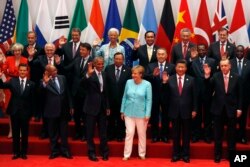World leaders gathered this week at the Group of 20 summit in Hangzhou, China, have set a six-month deadline on formulating a strategy to stop the flow of money that finances terrorist activities.
Prompted by recent attacks in Europe, the delegates representing the world's biggest economies agreed to develop a new Consolidated Strategy of Combating Terrorist Financing by March 2017.
A joint statement released by the group called for methods to crack down on the financial gains that groups earn through activities such as extortion, taxation, smuggling natural resources, looting cultural property, kidnapping for ransom and raising money through donations abroad.
A difficult task
G-20 leaders are pushing for countries to adopt the recommendations by a group that has been helping governments crack down on terrorism financing for nearly 15 years, said Denisse V. Rudich, the London-based director of G20 Research Group.
"Implementation of the action plan remains the key. Leaders need to allocate more funds to law enforcement bodies and the Financial Action Task Force, which has been leading the fight against terrorist financing since it was tasked to do so after 9/11," she told VOA. FATF is a Paris-based inter-governmental body engaged in setting standards for monitoring financial transactions with the aim of blocking money laundering and terrorist financing.
In a pledge issued after the two-day deliberations, the G-20 members said, "In confronting terrorism, we remain committed to effectively exchanging information, freezing terrorist assets, and criminalizing terrorist financing."
Tighter financial controls
There are, however, serious hurdles to the effort to expose both those businesses which secretly back the terrorists as well as those which allow fund-raising activities to continue because of lax financial controls.
Many countries have not adopted the standards and methods formulated by the Financial Action Task Force to monitor illicit transactions. The G-20 has now asked all member states to adopt FATF standards and prepare to implement the next batch of rules it will issue in the coming months.
"It takes time for countries to draft new legislation. And although many of them have done so, implementation remains the key," said Rudich of the G20 Research Group, which is affiliated with the University of Toronto.
She said the G-20 did the right thing by allocating the bulk of the work to the FATF.
How would the wealthier G-20 countries check the flow of terrorist and drug-tainted money to and from countries with active terror groups operating in them like Afghanistan, Pakistan, Iraq and Syria?
"One of the most effective ways of getting countries to adopt anti-terrorism standards is through naming and shaming them," Rudich said.
The G-20 has asked its members, along with the World Bank and International Monetary Fund, to support efforts to help countries improve their compliance with anti-money laundering standards and measures countering terrorist financing.





